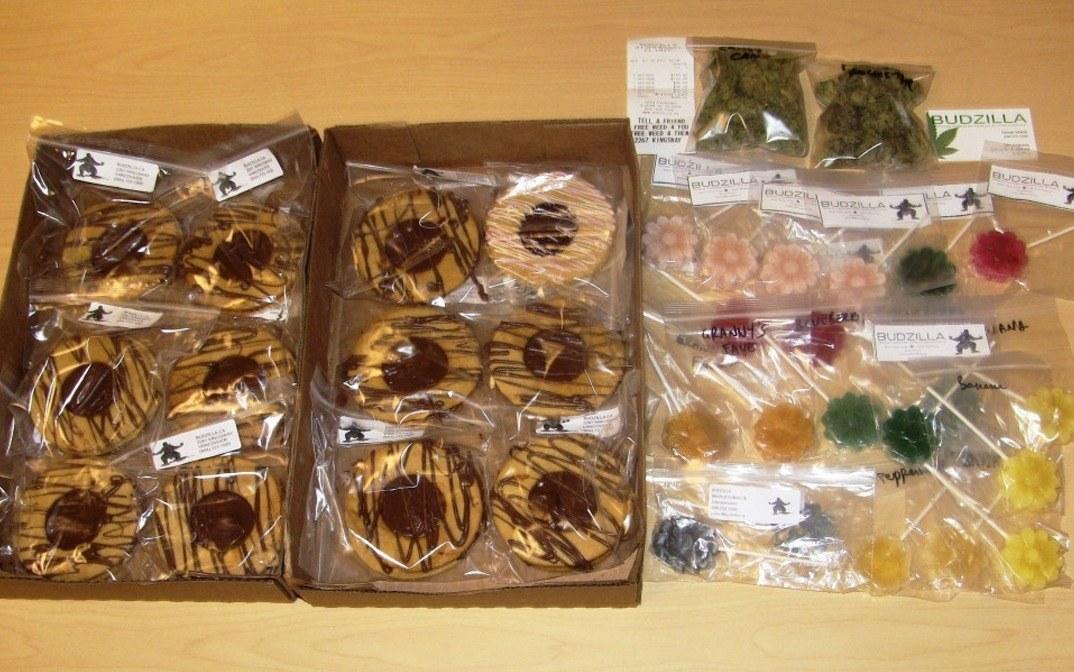Canadian medical marijuana patients have a right to tasty pot cookies and other cannabis products, the Supreme Court of Canada said Thursday.
~
Canadian medical marijuana patients have a right to tasty pot cookies and other cannabis products, the Supreme Court of Canada said Thursday.
In a stinging decision, a unanimous seven-justice bench said the government’s medical pot program was constitutionally flawed, breached patients’ rights and was not saved under section one of the Charter.
“Inhaling marihuana (the archaic legal spelling) can present health risks and is less effective for some conditions than administration of cannabis derivative,” the country’s highest bench said in an unsigned ruling.
There is no connection between the prohibition on non?dried forms of medical marihuana and the health and safety of the patients who qualify for legal access, the court added.
“It is therefore difficult to understand why allowing patients to transform dried marihuana into baking oil would put them at greater risk than permitting them to smoke or vaporize dried marihuana,” the justices said.
“Moreover, the Crown provided no evidence to suggest that it would. In fact, as noted above, some of the materials filed by the Crown mention oral ingestion of cannabis as a viable alternative to smoking marihuana. Finally, the evidence established no connection between the impugned restriction and attempts to curb the diversion of marihuana into the illegal market. We are left with a total disconnect between the limit on liberty and security of the person imposed by the prohibition and its object.”
The appropriate remedy the court said is a declaration that the law is of no force and effect to the extent that it prohibits a person with a medical authorization from possessing cannabis derivatives for medical purposes.
“It’s fantastic,” enthused Vancouver Island lawyer Kirk Tousaw, who with Abbotsford counsel John Conroy, handled the appeal.
“It goes into effect immediately — what else could you ask for? It’s wonderful. Fantastic.”
Jason Gratl, of the B.C. Civil Liberties Association, was also celebrating.
“It’s a great victory,” he said. “It carries the potential to be a stepping stone to significant changes on other legal issues such as the threshold for triggering the right to liberty and their use of the word ‘non-trivial’ is important, too.”
The court added that its declaration is not suspended in rejecting the government’s appeal and upholding the B.C. Court of Appeal decision, which had given Ottawa a year to fix the law.
Such a suspension left patients without lawful medical treatment and the law and law enforcement in limbo, the justices said.
The landmark decision changes the direction of the medical cannabis industry in Canada away from smoking by allowing a broad range of new products to become available.
The key point is that medical autonomy should be conceived of broadly to include not only amelioration of injury or illness, but also non-trivial enhancement, maintenance and preservation of health or well-being.
The choice of individuals to use what they experience as the most efficacious mode of using a medication is a non-trivial choice, and restricting that choice infringes the right to liberty, said the unanimous bench.
Chief Justice Beverley McLachlin along with Rosalie Abella, Thomas Cromwell, Andromache Karakatsanis, Richard Wagner, Clément Gascon and Suzanne Côté participated in the case that has its roots in a Dec. 2009 West Coast bust.
Former baker for the Cannabis Buyers Club of Canada, Owen Smith was arrested in his Victoria apartment with 200-plus cookies, a supply of cannabis-infused cooking oils and some dried dope.
He was charged under the Controlled Drugs and Substances Act with trafficking tetrahydrocannabinol (THC), one of the main psychoactive chemicals in pot and presumably the tasty snaps, and possession.
In 2012, B.C. Supreme Court Judge Robert Johnston acquitted Smith after ruling that the medical marijuana regulations were constitutionally flawed because they restricted patients’ therapeutic use of cannabis.
The Supreme Court of Canada affirmed the acquittal.
Tousaw said his client was thrilled to hear the news.
Both the old rules, known as the Marihuana Medical Access Regulations, and the new ones titled, the Marijuana for Medical Purposes Regulations, which came into effect April 1, restricted patients to only lawfully smoking or vaping dried cannabis.
Making extracts and other cannabis products such as tea, butter, balms, brownies, cakes, cookies, chocolate bars, hash, infused oils, creams or salves … was illegal.
Johnston, whose reasoning was endorsed by the top bench, said that constraint was arbitrary and did little to further a legitimate state interest.
He found criminalizing how a patient used his or her medicine an unwarranted infringement of security-of-the-person rights guaranteed under Section 7 of the Charter of Rights and Freedoms.
Marijuana’s active ingredients have a longer-lasting effect if they are ingested rather than inhaled, bringing greater benefit to those who use it to treat conditions such as chronic pain or glaucoma.
Smoking achieves a quicker, but less lasting benefit.
But for many patients, especially children and the elderly, the court heard, using extracts is a much more reasonable method of ingestion than smoking or vaping.
Last August, in a 2-1 judgment, the province’s top bench agreed with Johnston and rejected Ottawa’s appeal.
Smith no longer bakes for the compassion club but has been working on a feature-length play about his experience and blogging about extracts and options for patients.
Four other interveners, aside from the BCCLA added their voices to his cause — the Canadian Civil Liberties Association, Criminal Lawyers Association (Ont.), Sante Cannabis (a Que.-based business that connects patients to licensed producers), and the Canadian Aids Society, Canadian HIV/AIDS legal Network and the HIV/AIDS Legal Clinic of Ont. made a joint submission.
(The decision is available on the Supreme Court’s website. Extracts of its March hearing are available here.)
~





